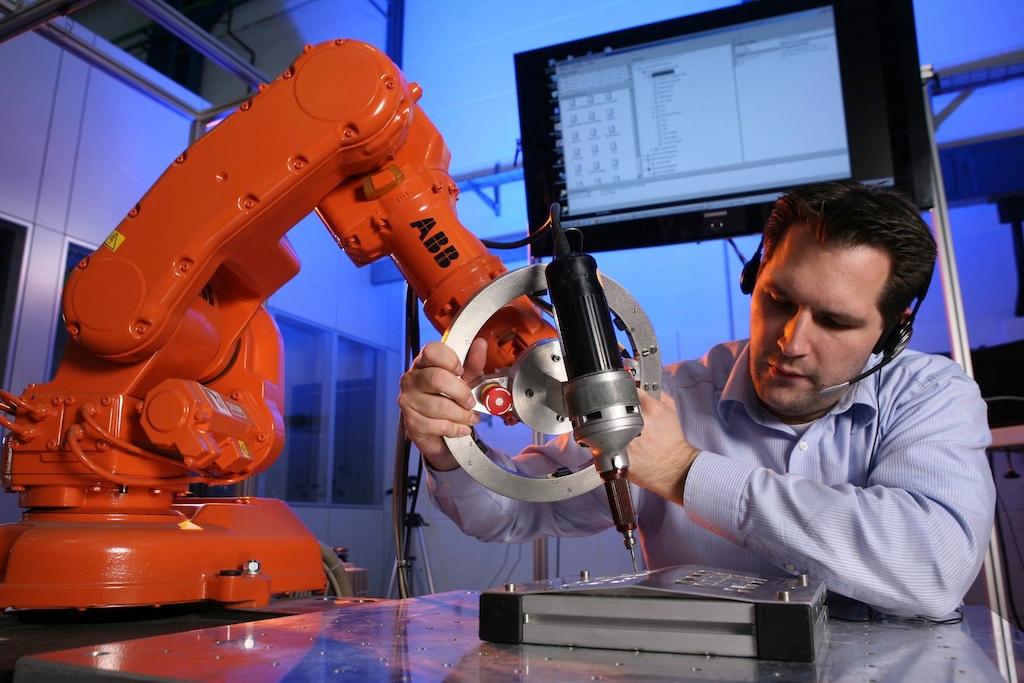Robots, not immigrants, could take half of German jobs
The SME robot invention by ABB.
BERLIN, Germany — Right-wing protesters marching against immigration and the so-called Islamization of Germany may soon face a new foe: the rise of the machines.
With low unemployment and a shrinking workforce, the economic engine of Europe continues to endeavor to reinvent itself as a nation of immigrants, even as the demise of the welfare state and fear of multiculturalism have brought tens of thousands of protesters to the streets.
But recent reports suggest that robots, not immigrants, may pose the greatest threat to German workers — though the European Union has placed a $4 billion bet that robots will create rather than eliminate jobs.
The new wave of automation will hit white-collar workers hardest, according to Jeremy Bowles, a researcher at the Brussels-based Bruegel Institute.
“What's fundamentally different is that [these advances] have the ability to affect a broader set of workers,” Bowles said, comparing the next generation of computerization to the first wave of robots that hit assembly line jobs in the 1980s.
The impact of these innovations will vary across Europe, Bowles argues. But in Germany, as in the US, robots may soon take as many as half the existing jobs, according to the Bruegel Institute's analysis of the labor market.
These white-collar robots will be more software than hardware, eliminating service industry jobs in the way ATMs and automated telephone systems have already done. But — as the hostile reaction from German unions to other disruptive business models (think Amazon and Uber) has shown — bytes can be more revolutionary than bolts.
Why, then, is the European Union investing $4 billion to speed the development of robotics?
Automation was the bogeyman of the 1980s, but the automobile industry's experience with it then proved that robots can not only increase productivity but also create jobs, says Uwe Haass, secretary general of the European Robotics Association (euRobotics AISBL).
“Robotics is seen as a pivotal technology, which is not only going into robotics per se but into so many other branches and technologies. It will create new jobs because [it will make] new businesses possible,” Haass said.
The introduction of robots to perform deepwater inspections of oil drilling facilities, for example, has created a profitable new business sector following disastrous oil spills in the North Sea and Gulf of Mexico.
A new generation of robot tools that operate like a worker's assistant, rather than their replacement, can help ensure that Germany's small, family-owned manufacturing businesses can stave off low-cost competitors from Asia.
Some robots in industries like agriculture, such as a self-driven picking machine, take over jobs that would otherwise go to migrant workers. But others make possible the tasks eliminated by high labor costs. In “precision farming,” for example, a robot nurse tends to individual plants, injecting water, pesticide or fertilizer in the precise amounts required — rather than spraying the entire field.
“All this is mesmerizing,” Haass said. “When I talk with people in agricultural industries, they are flabbergasted by these ideas.”
The EU suggests that robotics will have the net impact of creating 240,000 jobs across Europe, while a study by the International Federation of Robotics found recently that the 1 million industrial robots currently in operation were directly responsible for the creation of 3 million jobs.
To take advantage of those new opportunities, workers will need new skills, says Haass — and that will create major new challenges.
“How can we steer education in schools and universities to improve the qualification of people? How can we improve qualification of industrial workers who have been doing repetitve jobs?” he said.
“That's the crucial point.”
Over the longer term, these new developments could also mitigate immigration by unskilled workers, says economic researcher Bowles, because machines will become cheaper than workers more quickly in rich countries than in poor ones. But the rise of the machines is likely to inspire a lot of white-collar hand wringing before that happens.
“Historically, technology has created as many jobs as it has destroyed,” Bowles said. “[But] this exact topic has created panics for decades and decades.”
Every day, reporters and producers at The World are hard at work bringing you human-centered news from across the globe. But we can’t do it without you. We need your support to ensure we can continue this work for another year.
Make a gift today, and you’ll help us unlock a matching gift of $67,000!
